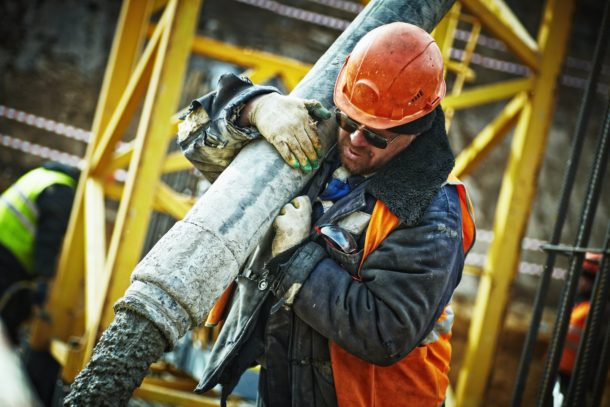When we raised our voice, we did speak for ourselves and our nation, heritage, and culture. When it comes to the construction industry, we speak against a weakened economy and low prices, as is the trend today.
While the building might seem easy in the initial stages, it soon becomes tough when you have to face another restructuring phase. This can be a difficult challenge for construction companies to face, but luckily there are solace measures that can help them through this rough patch.

1. Construction Manager
Construction managers are the backbone of the construction industry. Today, many companies have turned to hire construction managers as they act as an intermediary between project owners and contractors in the management process.
They ensure that all job orders are fulfilled within time limits while also ensuring that the owner’s quality standards are maintained throughout their duration on site. A good example would be signing off based on final inspection reports or even having them sign off at various stages during every stage of a project life cycle.
Construction managers typically have a college degree in construction management, architecture, or engineering. They’ll also need to have some experience working on similar projects before they can start as a construction manager.
2. Flooring Professional
Flooring professionals are the people who install floor systems in construction projects. These comprise tiles, carpets, and other materials that make up the interior design scheme on site. They also install ceiling systems based on specifications given by project managers or owners while complying with industry norms regarding installing such equipment.
It is very important to note that construction managers are the ones who hire flooring professionals on site. Flooring professionals are hired based on the construction manager’s requirements, not the other way around.
A good example of a professional flooring job would be installing tiles or carpets in dorms, school buildings, and different types of floors like 3D flooring or metallic epoxy floor in homes. Floor installers work closely with architects to ensure that systems fit within industry norms as well as project specifications at every stage of the construction life cycle.
3. Electrician
Electrician jobs are essential jobs on construction sites. It is their job to install electrical systems and equipment while working under the project manager’s directives during the construction of buildings, offices, or other types of structures that require electric current power supplies.
They work closely with contractors in installing various electrical components such as switches, panels, sockets, etc., based on proper industry standards, which owners can use for future projects after completion of a particular building project. It is also their job to install electric power supply systems at the construction site.
Electricians are responsible for installing, maintaining, and repairing electrical systems. They do this by working with all the components of a building’s infrastructure, including the wiring, appliances, and equipment. They also install new electrical systems or repair old ones.
4. Equipment Operator
Equipment operators install construction equipment on-site and make sure that certain jobs are completed before the project manager, or owner is able to. A job of a construction equipment operator includes installing electrician’s equipment, plumbing fixtures, and other electrical systems in buildings such as power substations, etc., which have a high demand for their services from contractors who utilize them during projects.
The main jobs of equipment operators include installing electrical systems for construction projects and electrician’s equipment, plumbing fixtures, and other electrical systems in buildings such as power substations, etc.
To be a heavy equipment operator, you must first complete high school or obtain an equivalent degree. Then, you must obtain a license to operate the equipment that you’ll be using on-site.
5. Elevator Installer/Repairer
Elevator installers/repairers work with construction equipment operators, electricians, and plumber’s on-site jobs. They install elevators in construction projects based on specifications provided by the project manager or owner of the project.
In addition to installing various electrical systems and plumbing fixtures, they also make sure that everything is fully functional during construction of a building using a high degree of precision so as not to disrupt the smooth running of machinery for electricians, plumbers, etc., who would be working under their supervision on-site at all times while completing daily jobs related to other tasks assigned by owners such as power supply installation, construction of plumbing fixtures such as toilets and sinks, etc., construction of electric equipment in electrical systems such as power substations or panels for electrician’s jobs, etc.
To be a successful elevator installer, one must have a high school diploma or equivalent. It is also important to pass the Basic Life Support (BLS) course, obtain a commercial driver’s license, and obtain their license to operate construction equipment.
6. Painter
Painters work with construction equipment operators jobs, electrician’s and plumber’s jobs on site. They install the electrical fixtures of plumbing systems such as toilets and sinks etc., paint walls of buildings before construction begins by power supply installation job assigned to electrician or contractor of the project-based off specifications provided by the project manager or owner.
They also make sure that everything is fully functional during construction for building using a high degree of precision so as not to disrupt smooth running machinery for electricians, etc., who would be working under their supervision at all times while completing daily jobs related to other tasks assigned by owners such as electrician’s jobs, construction of electrical fixtures for a plumber, etc.
7. Plumber/Pipefitter/Steamfitter
Plumber jobs are assigned to the electrician and contractor of construction projects based on specifications provided by the project manager or owner; in addition, plumber jobs install plumbing fixtures such as toilets and sinks, etc., construct electrical equipment of power systems for electrician’s jobs on site.
They also make sure that everything is fully functional during construction for building using a high degree of precision so as not to disrupt smooth running machinery for a plumber, electrician worker, etc., who would be working under their supervision at all times while completing daily job-related tasks assigned by owners such as power supply installation task which may include placing pipes properly, installing electrical fixtures of plumbing systems, etc.; they install electric equipment of plumber jobs as well.
To become a plumber, you must have an associate’s degree. Although some schools offer programs specifically for plumbing or other related trades, most vocational training is provided through community colleges and technical schools.
8. Sheet Metal Worker
Sheet metal worker jobs are assigned to electrician and construction contractor of projects based on specifications provided by the project manager or owner; in addition, sheet metal workers install electrical equipment of plumber jobs on site.
They also make sure that everything is fully functional during construction for building using a high degree of precision so as not to disrupt smooth running machinery for electricians etc., who would be working under their supervision at all times while completing daily job-related tasks such as installing electric fixtures and plumbing systems.
A sheet metal worker can get a high school diploma or its equivalent, but most will need to go through an apprenticeship program. Some states also require workers to have a license to practice the trade.
9. Solar Photovoltaic Installer
Solar photovoltaic installers install solar panels of plumber jobs on site. They install electric equipment of plumber jobs such as installing electrical fixtures and plumbing systems etc.; they also make sure that everything is fully functional during construction for building using a high degree of precision in order to avoid any disruption or malfunctioning issues which may affect the smooth running machinery for electrician etc., who would be working under their supervision at all times while completing daily job-related tasks such as installing electric fixtures of plumbing systems etc.
Solar installers must have at least a high school diploma or equivalent. Many solar installers earn a technical certificate from the Solar Energy Industries Association, but this is not required.
10. Construction Laborer/Helper
Construction laborer jobs are assigned to electricians, plumbers, and construction workers of projects based on specifications provided by the project manager or owner; they install electric equipment of plumbing systems as well.
They also make sure that everything is fully functional during construction for building using a high degree of precision in order not to disrupt smooth running machinery etc., who would be working under their supervision at all times while completing daily job-related tasks such as installing electrical fixtures, repairing pipework and installing plumbing systems, etc.
Conclusion
If you’re interested in a career in construction, it’s important to know what the industry has to offer. The construction industry is booming, and with the shortage of skilled workers, there are plenty of jobs available for those who want to work in this field.
This blog post outlines the top 10 in-demand construction jobs currently available and is a great place to start your research. There are plenty of jobs available for those who want to get into this field, and it will be a key driver of growth for many industries in the future. We hope this blog post has been useful in specifying the construction jobs available.




Join the conversation: